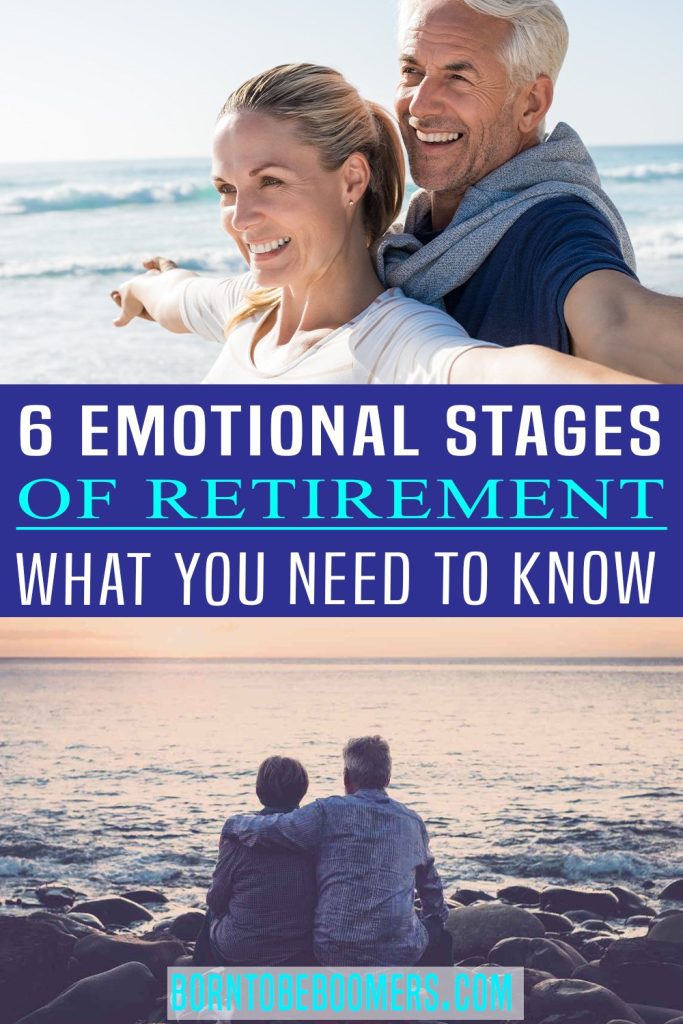You are over 50 and starting to take retirement seriously or you are recently retired. As you near the big day, you can see there is light at the end of the tunnel. No more bosses, schedules, or obligations. But is retirement all it is cracked up to be? After the first year, some will become disillusioned with retirement.
Coming up with a retirement strategy should include understanding that retirement is fluid. Your emotions can change along with it. There are different emotional stages of retirement that include preparation, excitement, honeymoon, disappointment, and the final stages are reorganization and stability. Knowing the stages can help you to recognize when this is on the horizon and take measures ahead of time.
Understanding these 6 emotional phases of retirement is important so you can be prepared and possibly adjust your situation before you become disillusioned. Often seniors can feel displaced and suffer from depression when they are adjusting to retirement life.
Often when you are at the end of something, you’re at the beginning of something else. Fred Rogers
Table of Contents
Preparation
You have been waiting for retirement all of your life and you finally get to prepare. You are anywhere from 5-10 years away from retiring. Depending on the type of person you are this can mean charting all of your retirement plans on paper, reading retirement guides or watching videos on how others are retiring.
No matter how you learn, you are actively looking for ideas on how to chart out your retirement. You can feel the excitement building as you research a new town to live in, downsizing your home or what kind of RV you want to travel in for some road trips.
You are checking your retirement accounts. Meeting with your financial advisors and attorney. Collaborating with your spouse and friends to hear their ideas. There are so many options and variables.
What you will want to be cognoscente of in this stage is that, although getting rid of that job sounds amazing, it has also been your routine and your life for many years.
There is more to retirement planning than just financial planning, relocating to a new town or home, or travel. You will want to take into consideration your spiritual and social plans as well. Emotional health during retirement is often ignored by potential retirees.
Make no little plans; they have no magic to stir men’s blood. Make big plans, aim high in hope and work.”– Daniel H. Burnham
Excitement
You are finally here! You are less than a year, maybe even weeks from retirement. Now you are counting down the days to your retirement party. It comes and everyone is wishing you well. Your friends and family are excited, you may even throw a party at home or go out for an extravagant night on the town.
You can not wait until the first weekday when you no longer have to set an alarm or rush in the morning to get to work. Maybe you even have a trip planned or your tee times scheduled. Maybe you are the type to live each day without a plan!
Alternatively, you may feel some hesitation or restlessness about retiring. You will be leaving your routine, your work friends and a way of life. Some common questions and feelings that can arise are:
- Will I have enough money to do the things I want?
- Can I really afford that large purchase? (RV, World Cruise, Boat, 2nd home)
- Will I get bored?
- Will I be too busy?
Retirement anxiety can be a concern for many. There are big changes coming. Many folks who are retiring are losing their routine and work relationships.
Sometimes the best thing to do is make no changes at first. Just hang out and get used to not working. After a month or two, maybe even 6 months, you can find your rhythm and start implementing your retirement plans.
Either way, the anticipation is real!
When a man retires and time is no longer a matter of urgent importance, his colleagues generally present him with a watch. R.C. Sherriff

Honeymoon
The honeymoon stage is the best part of retirement, but also the most deceptive! You are ready to travel, buy the toys and move to a warmer climate. You start visiting family, you are a regular on travel websites, you may even take some classes, people are starting to see you more regularly at the club.
Whatever you are doing, you are excited about the future and all the fun things you are getting to do. The honeymoon stage can last for months or years depending on your personality type. My honeymoon phase lasted about two years. The average retiree reports this phase ends in about a year.
If people concentrated on the really important things in life, there’d be a shortage of fishing poles. Doug Larson
Disillusionment
Many retirees feel let down by their retirement. This phase may come along when you realize that retirement is not what you thought it would be. Playing your favorite sport may have lost its appeal when you have access to it all day every day. Taking classes will only last so long. Hobbies can seem boring. Even travel can become mundane. You can feel like you have run out of ways to fill up your day and boredom can set in.
Health issues can also become a burden. Doctor’s visits and limitations placed by physical decline, especially if this happens when you are younger can cause retirees to become disillusioned by their circumstances.
For me, we experienced the pandemic, so my little retirement business was no longer doing as well as it once was. Now the second wave is coming so there is very little chance things will turn around for a while.
While I was not dependent on the money I earned from the business, I had created significant momentum with the business and a lifestyle with it, that all just stopped. Our travel plans were nonexistent and after 9 months of being home, it began to take a toll on me emotionally. This phase can happen to anyone whose plans change due to unforeseen circumstances.
“The trouble with retirement is that you never get a day off.” – Abe Lemons
Reorientation
This is the stage where you reevaluate your plans. This is where all of your emotions about retirement come into play. You revisit your retirement plan based on your current realities and get back to basics and find your purpose again for retirement.
Now you will want to re-evaluate your spiritual, emotional and physical needs. Maybe adding volunteerism to your weekly schedule can help you find purpose. Or get a part-time job that gets you out of the house.
Here are some ideas to help you find more purpose in your retirement classes.
- Take college courses – They are offered at a low cost or even free when you are not looking to pursue a degree. Coursera is a great resource.
- Volunteering – Catchafire is an organization that matches your skills to volunteering opportunities.
- Exercise – Staying active when you retire is imperative to not only your physical health but your emotional health as well. It gets you out of the house and also helps you to stay physically fit.
- Make new friends – Look for new social opportunities in your local political groups, foodie clubs, and other social clubs.
- Try new hobbies – There are so many hobbies out there. Even if you do not think you will like some try it just for the fun of it. Often you can take a class to try something before committing.
Calendar Exercise
In order to see where you have more time do a quick exercise and map out your week in a calendar. Fill out your sleeping and eating hours first. Then your already scheduled activities that are must to-dos like family time. Can you rearrange some things to free up more time? Can your retirement days be used more thoughtfully?
Next, do some research on the activities that you want to add. How much time do you want to commit to this new activity? Then see what that time commitment looks like on your calendar.
I always likened retirement to falling off a cliff, and then you have to kind of brush yourself off. Steve Young

Stability
Once you find more purposeful retirement activities to fill your days, you will move into the stability phase. You will want to stay flexible but still have somewhat of a routine so you can feel stable. Remember, when you were working, you had a daily routine for many years. The key is to find your purpose so you do not feel aimless.
The stability phase really never ends. And the interesting thing is, as you age, you can go back to one of the other phases and then back to stability as you adjust. The important thing is retirement is fluid and can change as our abilities can change!
Aging seems to be the only available way to live a long life. Kitty O’Neill Collins






46 responses to “6 Emotional Stages of Retirement: What You Need To Know!”
Excellent information! Thank you for sharing, it never thought about how the emotional aspects would effect retirement.
I did not really either, but here I am! But it is easy to work through it. The one thing is that in retirement, you have time to be flexible!
Great insight on being prepared for the retirement age. So much good info here!
Thank you Maya! Some may never go through all of the stages of retirement, but if they do it is good to know what they are and how to manage them.
I didn’t realize there were so many emotional stages to retiring. I know it’s what most of us look forward to and many say they never knew how they fit all of life in before retiring. You really made retirement appear clearer… I know now what to expect and I’m still excited…
I often feel that way. I guess the question is… were we really living to our full potential when we were working?
These are some great points. I’m sure the emotional adjustment is an often-overlooked aspect of retirement, so this is excellent information.
Thanks Danielle! I do not think people realize how the social aspects of working are difficult to part with. It is important to maintain those friendships as we age.
This is great info! I’ve never really thought about the emotional aspects of retiring…other than I’ve read that some men die soon after retiring if they don’t have enough to do. And also…I don’t ever plan to retire!
Well good for you! Me either, but I do live a retirement lifestyle for the most part. So I was feeling the disillusionment stage this year when I could not travel. On to better days!
This is such an important and beneficial post – so many people go into this phase of their life without any forewarning and really suffer mentally and financially.
Exactly! The key is being prepared for the stages. If you recognize them early you can already have a plan in place to combat them.
My husband is already considering retiring and he just turned 50….the joys of 20 years on the Fire Department!
Ahhh! I know plenty of guys in government services who are doing the same. Most will start another career or business to stay busy though. But it is nice to have that 20-year pension!!
Change is always difficult. Thank you for the insights as to what can be expected!
Thanks Suzanne! Change can be exciting too. It just all depends on your perspective and preparedness.
Great article! We are getting close to retirement(my husband is) and it’s scary and exciting at the same time! We don’t want to rush into it while he still has a good paying job! I am going to refer to this again and again, and share it with my husband! Thanks!
Awesome! And congrats on getting closer. Being realistic about finances is smart, too!
Great post! I’m a little young to fully appreciate this yet, but I saw my mom go through these stages just this year. She retired after 37 years of nursing just prior to COVID. She was defintiely relieved!
And with a medical background, if she gets bored, there are many volunteer opportunities out there that she can help with.
Great realistic expectations of what to expect and how to navigate this path!
Thanks Barbara! I felt it was important to increase awareness for retirees.
I feel like I went through some of these stages when I lost my job to Covid.
I can totally see that! A great way to combat those feelings is to volunteer or take classes. There is so much online now. Hopefully, things will get better soon!
My parents and in-laws are all nearing or hitting retirement. I’ll be sharing this with them all for sure!
Awesome! I hope it helps them in their retirement journey!
Thanks for sharing these helpful tips for those ready to retire!
Thank you, Justine!
All great points to consider. Really enjoyed all of the quotes too!
Thanks Debbie! The quotes keep things in perspective! lol
Great tips! Retirement is very far into the future for me, but these tips will help me prepare early!
Thanks Sydney!
Wonderfully written! I just was thinking as I am aging that some of the other people in my life seem to be losing their hearing!!
Thanks Holly! I appreciate that!
I believe this 100%. I think you nailed how most people feel. I would need something to keep me social and busy.
Yes! Retirement is not about sitting on the couch.
I can absolutely understand how this could be a difficult transition in life, especially given our climate today! Even in a “normal” year, the changes that come with retirement can be hard to handle. I think the idea of “keeping busy but flexible” is a philosophy to keep.
Yes the thought of schedules can be daunting to a new retiree. The flexible part is a must so you can pursue your dreams and hobbies.
This is so interesting, but makes total sense! I’m sure retirement is such an adjustment, providing both uncomfortable change and exciting opportunity.
Yes! Exactly! Someone who does not enjoy change can struggle but having a plan in place ahead of time can be so helpful!
This is filled with some good points! Everyone needs some sort of routine and this pandemic has messed a lot of routines up!
Absolutely! I feel so much for those that are isolated and alone.
Great information, I think my dad could have used this when he first retired. Thank you for sharing.
It is never too late to make adjustments! I hope he can use some of the suggestions.
This is great information to know. Being prepared for the reality of the changes that go along with retirement can help lessen any anxiety and stress.
That is exactly it. Being prepared. Just like everything else we need to know what is coming so we can be ready!